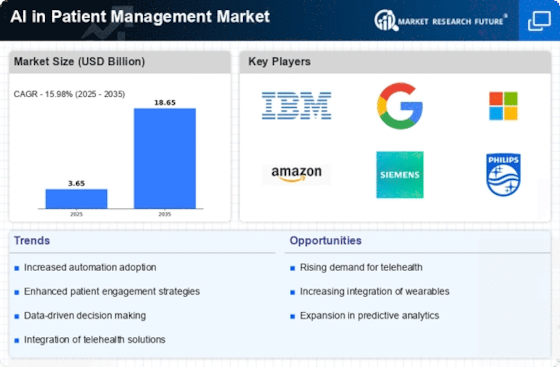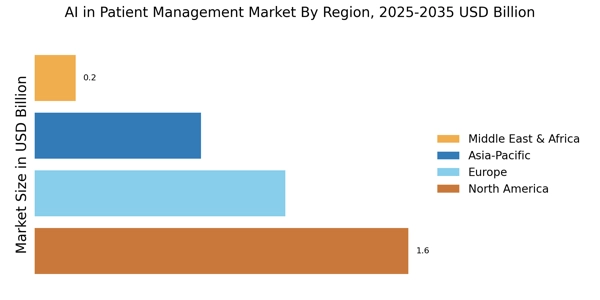Growing Focus on Patient-Centric Care
There is a growing focus on patient-centric care within the AI in Patient Management Market. Healthcare providers are increasingly recognizing the importance of tailoring treatments to individual patient needs. AI technologies facilitate this shift by enabling personalized treatment plans based on comprehensive patient data analysis. This trend is supported by the increasing patient engagement and satisfaction metrics, which are becoming critical performance indicators for healthcare organizations. As a result, the market for AI solutions that support patient-centric approaches is expected to expand, with projections indicating a potential market size of USD 20 billion by 2027.
Regulatory Support for AI Innovations
Regulatory support for AI innovations is emerging as a significant driver in the AI in Patient Management Market. Governments and regulatory bodies are beginning to establish frameworks that encourage the development and deployment of AI technologies in healthcare. This support is crucial for fostering innovation while ensuring patient safety and data security. For instance, initiatives aimed at streamlining the approval process for AI-based medical devices are gaining traction. Such regulatory advancements are likely to enhance market confidence and stimulate investment in AI solutions, with the market expected to witness a growth rate of approximately 30% over the next five years.
Advancements in Machine Learning Algorithms
Advancements in machine learning algorithms are propelling the AI in Patient Management Market forward. These algorithms enable the analysis of vast amounts of patient data, leading to more accurate diagnoses and personalized treatment plans. The ability to predict patient outcomes based on historical data is becoming increasingly sophisticated. For example, machine learning models can identify patterns in patient behavior, which can inform proactive management strategies. The market for machine learning in healthcare is expected to grow significantly, with estimates suggesting a compound annual growth rate of over 40% in the coming years. This growth underscores the potential of AI technologies to transform patient management.
Integration of AI with Electronic Health Records
The integration of AI with electronic health records (EHR) is a pivotal driver in the AI in Patient Management Market. By embedding AI capabilities into EHR systems, healthcare providers can enhance data accessibility and improve clinical decision-making. This integration allows for real-time data analysis, which can lead to timely interventions and better patient outcomes. Reports indicate that the EHR market is expected to reach USD 40 billion by 2025, with AI integration playing a crucial role in this growth. As healthcare organizations seek to leverage their data more effectively, the demand for AI-enhanced EHR systems is likely to increase.
Rising Demand for Efficient Healthcare Solutions
The AI in Patient Management Market is experiencing a surge in demand for efficient healthcare solutions. As healthcare systems grapple with increasing patient loads and the need for improved outcomes, AI technologies are being integrated to streamline operations. For instance, AI-driven tools can automate administrative tasks, thereby allowing healthcare professionals to focus on patient care. According to recent estimates, the market for AI in healthcare is projected to reach USD 45 billion by 2026, indicating a robust growth trajectory. This demand is further fueled by the need for cost-effective solutions that enhance patient management and reduce operational inefficiencies.


















